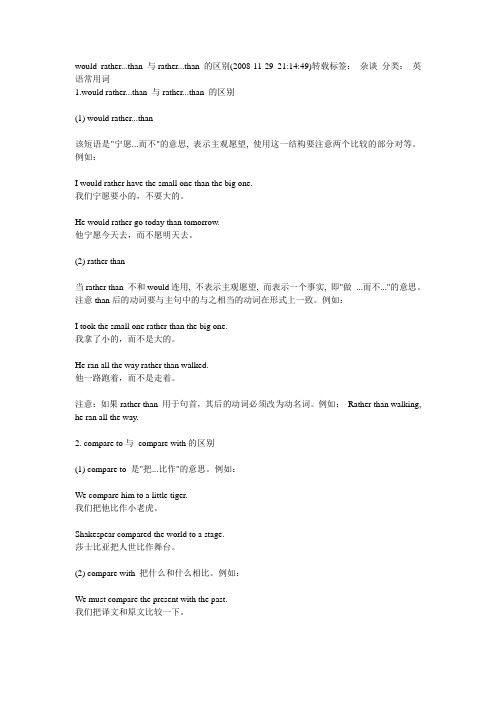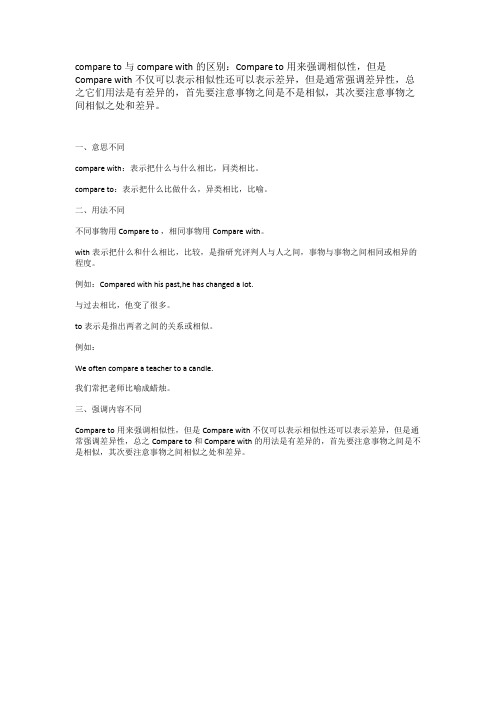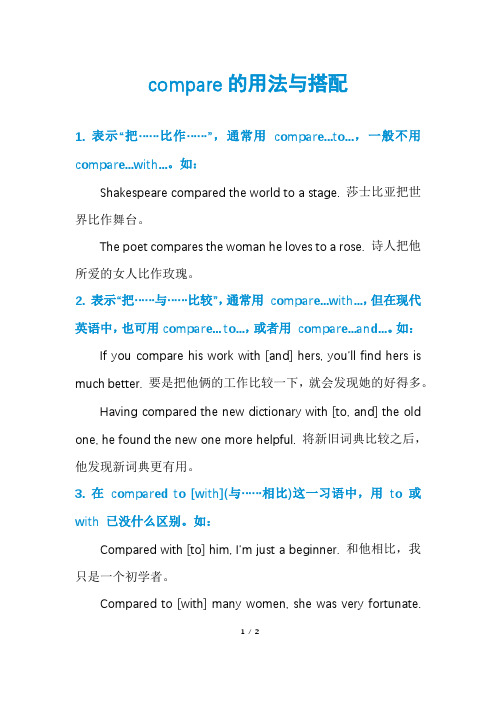compare to与compare with的区别
英语comparewith和compareto的区别

英语comparewith和compareto的区别
英语中,compare with 和compare to 是我们经常用到的词组,都有“比较”的意思。
但是它们的用法有所不同,今天我们一起学习一下。
1. compare with:意思是“将……和……比较”,强调同类之间的比较,从而发现不同之处。
例句1:She compared her bag with mine.
她拿自己的书包跟我的作比较。
例句2:How does swine flu compare with avian flu as a pandemic threat?
同是疫病威胁,猪流感与禽流感相比如何?
例句3:No other river on earth can compare with it.
世上没有哪条河能和它相比。
2. compare to:意思是“把……比作……”,主要强调异类相比。
例句4:Books can be compared to friends.
书籍好比朋友。
例句5:The student compares his teacher to his mother.
这个学生把老师比作他的母亲。
例句6:This little boy compares his dog to his best friend.
这个小男孩把他的狗比作最好的朋友。
通过以上的学习,大家可以看出,这两个词组还是有一定的区别的,请在以后的应用中注意区分。
几个词义的辨析

1、【词语辨析】care about/ care for(1)care about和care for都有“关心、照料”的意思;(2)二者的区别是care about还指“介意、在乎”,care for指“喜欢、想要”。
(3)一句话记忆:The man whom you care for never cares about what people say.2、【词语辨析】 excited / exciting(1)exciting既可修饰人也可修饰物。
修饰人时,指人“有鼓动力的”;修饰物时,指事物“令人兴奋的,令人激动的”。
(2)excited一般只可修饰人,指人“激动的,兴奋的”。
(3)一句话记忆:We were excited to hear the exciting news.3、【词语辨析】compare to / compare with(1) compare...with...把…和…比较(常表示同类相比,比较);(2)compare...to...把…比作…(常表示异类相比,比喻)。
(3)例句:——The poets often compare life to a river. ——My English can't compare with his.4、【词语辨析】 friendly with / friendly to(1)friendly to指“对……友好/友善”,后可跟人或物;(2)friendlywith后一般跟人,指“与某人友好相处”。
(3)一句话记忆:He is friendly to the plan and I am not, but we are still friendly with each other.5、【词语辨析】get in /get on(1)get in/get on都指“上(车)”但车不同:get in一般指上小汽车,出租车;get on 指上飞机,船,公共汽车,火车,自行车,马等。
compare的用法和例句

compare的用法和例句一、了解"compare"的基本用法及其在句子中的不同位置在英语中,动词"compare"用于比较两个或多个事物之间的相似性或差异。
它可以作为及物动词,后接名词、代词或动名词作宾语;也可以是不及物动词,后接介词短语构成状语从句。
1. "Compare"作为及物动词当"compare"作为及物动词时,常与名词、代词或动名词连用,并通过介绍类似性和差异来进行对比。
例句1: I compared the two smartphones before making a decision. (我在做决定之前将这两款智能手机进行了对比。
)例句2:She compared her English skills with her sister's and realized she needed more practice.(她将自己的英语技能与姐姐的进行了比较,并意识到自己需要更多的练习。
)在上述例句中,我们可以观察到"compare + 宾语"的结构。
这种结构可以帮助读者理解作者正在比较两个主体之间的相似点和不同点。
2. "Compare"作为不及物动词当"compare"作为不及物动词时,通常会后接一个以介词开头的短语来表示对比的参照物。
例句3:He compared the prices in different stores and found the best deal. (他对不同商店的价格进行了比较,并找到了最好的交易。
)例句4:We can compare this situation to a sinking ship, with everyone desperately trying to keep afloat.(我们可以将这种情况比作一艘正在下沉的船,每个人都在拼命地想办法保持浮出水面。
would rather than 用法

would rather...than 与rather...than 的区别(2008-11-29 21:14:49)转载标签:杂谈分类:英语常用词1.would rather...than 与rather...than 的区别(1) would rather...than该短语是"宁愿...而不"的意思, 表示主观愿望, 使用这一结构要注意两个比较的部分对等。
例如:I would rather have the small one than the big one.我们宁愿要小的,不要大的。
He would rather go today than tomorrow.他宁愿今天去,而不愿明天去。
(2) rather than当rather than 不和would连用, 不表示主观愿望, 而表示一个事实, 即"做...而不..."的意思。
注意than后的动词要与主句中的与之相当的动词在形式上一致。
例如:I took the small one rather than the big one.我拿了小的,而不是大的。
He ran all the way rather than walked.他一路跑着,而不是走着。
注意:如果rather than 用于句首,其后的动词必须改为动名词。
例如:Rather than walking, he ran all the way.2. compare to与compare with的区别(1) compare to 是"把...比作"的意思。
例如:We compare him to a little tiger.我们把他比作小老虎。
Shakespear compared the world to a stage.莎士比亚把人世比作舞台。
(2) compare with 把什么和什么相比。
例如:We must compare the present with the past.我们把译文和原文比较一下。
compare to与compare with的区别

compare to与compare with的区别:Compare to用来强调相似性,但是Compare with不仅可以表示相似性还可以表示差异,但是通常强调差异性,总之它们用法是有差异的,首先要注意事物之间是不是相似,其次要注意事物之间相似之处和差异。
一、意思不同
compare with:表示把什么与什么相比,同类相比。
compare to:表示把什么比做什么,异类相比,比喻。
二、用法不同
不同事物用Compare to ,相同事物用Compare with。
with表示把什么和什么相比,比较,是指研究评判人与人之间,事物与事物之间相同或相异的程度。
例如:Compared with his past,he has changed a lot.
与过去相比,他变了很多。
to表示是指出两者之间的关系或相似。
例如:
We often compare a teacher to a candle.
我们常把老师比喻成蜡烛。
三、强调内容不同
Compare to用来强调相似性,但是Compare with不仅可以表示相似性还可以表示差异,但是通常强调差异性,总之Compare to 和Compare with的用法是有差异的,首先要注意事物之间是不是相似,其次要注意事物之间相似之处和差异。
英语中相似的单词比较

英语中相似的单词比较4月16日1、【词语辨析】care about/ care for(1)care about和care for都有“关心、照料”的意思;(2)二者的区别是care about还指“介意、在乎”,care for指“喜欢、想要”。
(3)一句话记忆:The man whom you care for never cares about what people say.2、【词语辨析】 excited / exciting(1)exciting既可修饰人也可修饰物。
修饰人时,指人“有鼓动力的”;修饰物时,指事物“令人兴奋的,令人激动的”。
(2)excited一般只可修饰人,指人“激动的,兴奋的”。
(3)一句话记忆:We were excited to hear the exciting news.3、【词语辨析】compare to / compare with (1) compare...with...把…和…比较(常表示同类相比,比较);(2)compare...to...把…比作…(常表示异类相比,比喻)。
(3)例句:——The poets often compare life to a river. ——My English can't compare with his.4、【词语辨析】 friendly with / friendly to (1)friendly to指“对……友好/友善”,后可跟人或物;(2)friendlywith后一般跟人,指“与某人友好相处”。
(3)一句话记忆:He is friendly to the plan and I am not, but we are still friendly with each other.5、【词语辨析】get in /get on(1)get in/get on都指“上(车)”但车不同:get in一般指上小汽车,出租车;get on指上飞机,船,公共汽车,火车,自行车,马等。
compare的用法与搭配

compare的用法与搭配1. 表示“把……比作……”,通常用compare...to...,一般不用compare...with...。
如:Shakespeare compared the world to a stage. 莎士比亚把世界比作舞台。
The poet compares the woman he loves to a rose. 诗人把他所爱的女人比作玫瑰。
2. 表示“把……与……比较”,通常用compare...with...,但在现代英语中,也可用compare... to...,或者用compare...and...。
如:If you compare his work with [and] hers, you’ll find hers is much better. 要是把他俩的工作比较一下,就会发现她的好得多。
Having compared the new dictionary with [to, and] the old one, he found the new one more helpful. 将新旧词典比较之后,他发现新词典更有用。
3. 在compared to [with](与……相比)这一习语中,用to 或with 已没什么区别。
如:Compared with [to] him, I’m just a beginner. 和他相比,我只是一个初学者。
Compared to [with] many women, she was very fortunate.1/ 2和许多女人相比,她算是很幸运的了。
4. 用作不及物动词时,compare 后习惯上只接with,多与情态动词can 连用,表示“比得上”“能与……比美”,但一般用于否定句或疑问句中。
如:Nothing can compare with wool for warmth. 没有比羊毛更暖和的东西了。
Life in a town can’t compare with life in th e country. 乡村的生活比城镇的生活好得多。
几个词义的辨析

几个词义的辨析1、【词语辨析】care about/ care for(1)care about和care for都有“关心、照料”的意思;(2)二者的区别是care about还指“介意、在乎”,care for指“喜欢、想要”。
(3)一句话记忆:The man whom you care for never cares about what people say.2、【词语辨析】 excited / exciting(1)exciting既可修饰人也可修饰物。
修饰人时,指人“有鼓动力的”;修饰物时,指事物“令人兴奋的,令人激动的”。
(2)excited一般只可修饰人,指人“激动的,兴奋的”。
(3)一句话记忆:We were excited to hear the exciting news.3、【词语辨析】compare to / compare with(1) compare...with...把…和…比较(常表示同类相比,比较);(2)compare...to...把…比作…(常表示异类相比,比喻)。
(3)例句:——The poets often compare life to a river. ——My English can't compare with his.4、【词语辨析】 friendly with / friendly to(1)friendly to指“对……友好/友善”,后可跟人或物;(2)friendlywith后一般跟人,指“与某人友好相处”。
(3)一句话记忆:He is friendly to the plan and I am not, but we are still friendly with each other.5、【词语辨析】get in /get on(1)get in/get on都指“上(车)”但车不同:get in一般指上小汽车,出租车;get on 指上飞机,船,公共汽车,火车,自行车,马等。
- 1、下载文档前请自行甄别文档内容的完整性,平台不提供额外的编辑、内容补充、找答案等附加服务。
- 2、"仅部分预览"的文档,不可在线预览部分如存在完整性等问题,可反馈申请退款(可完整预览的文档不适用该条件!)。
- 3、如文档侵犯您的权益,请联系客服反馈,我们会尽快为您处理(人工客服工作时间:9:00-18:30)。
compare to与compare with的区别
■compare...with...把……和……比较(常表示同类相比,比较) compare...to...把……比作……(常表示异类相比,比喻)
①Let's compare this article with that one. 让我们把这篇文章和那篇文章作一下比较。
②The heart is often compared to a pump. 心脏常被比作水泵。
■compare的过去分词短语形式用作状语时, 不管同类还是异类, compared with和compared to都可以用。
例:
Compared with/to western countries, China uses materials very carefully. 和西方相比,中国使用物资很节省。
■ compare ...with...有时相当于compare ...and...
当涉及考察两个相象的事物以辨别他们的相似或差别时,它取with :
The police compared the forged signature with the original. 警察将伪造的签名与原来的作比较。
You should only compare like with like. 只应在同类事物中作比较。
You just can't compare Tom and Bryan. 你无法比较汤姆和布莱恩。
You just can't compare Hawaii and Alaska. 你压根儿没法把夏威夷同阿拉斯加相比。
This one cannot compare with that one. 这个与那个无比较。
Walking can't compare with flying. 走路比不上飞
■当它涉及描述不同事物相似性的活动时,Compare 常用介词 to :
He compared her to a summer day. 他将她比为夏天。
Scientists sometimes compare the human brain to a computer. 科学家有时将人脑比作电脑。
compare…with; compare…to; compared with/to
■compare…with意为“把……与……相比”,侧重指两者间的区别。
如:Compare this car with that one, and you will find the differences between them.
把这辆汽车与那辆汽车相比较,你就会发现它们之间的区别。
■compare…to…意为“把……比作……”,着重注意两者间的相似点。
如:
This song compares our country to a big family.这首歌把我们的国家比作一个大家庭。
■compare既可以单独用作及物动词,也可用作不及物动词。
用作不及物动词时,以compare with…形式出现,表示“与……相比”。
如:
Living here can’t compare with living in Shanghai.在这儿生活不能和在上海(生活)相比。
If you compare the two words, you can tell the difference between them.
如果你比较这两个单词,你就会辨别出它们之间的不同。
■compared with…和compared to…都可用作状语,意义基本相同,可互换。
如:
Compared to/with him, you are lucky.与他相比,你是幸运的。
It was a small town then, compared to/with what it is now.和现在比起来,那时它还是个小镇。
